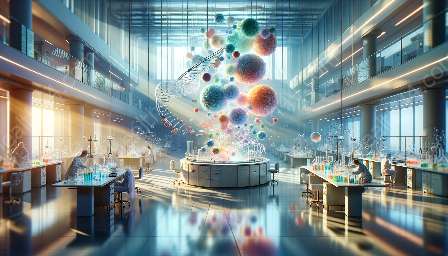Bioenergetics is a captivating field that delves into the fundamental processes of energy production, transfer, and utilization in living organisms. It forms a crucial foundation in both biochemistry and health education, as it unravels the intricate mechanisms behind cellular energy metabolism and its significance in maintaining overall health.
The Basics of Bioenergetics
At its core, bioenergetics investigates the flow and transformation of energy within biological systems. It encompasses the study of various energy-transducing processes, such as photosynthesis, cellular respiration, and the metabolic pathways that generate adenosine triphosphate (ATP), the universal currency of energy in living organisms.
ATP plays a pivotal role in powering various cellular activities, including muscle contraction, biosynthesis of macromolecules, and nerve impulse propagation. Understanding the intricate mechanisms of ATP production and utilization is essential in comprehending the physiological and biochemical processes that underpin life.
Key Concepts in Bioenergetics
Within the realm of bioenergetics, several key concepts form the backbone of our understanding of energy dynamics in living systems:
- The role of enzymes and coenzymes in catalyzing energy-yielding reactions
- The interconnectedness of metabolic pathways and their regulation to maintain energy balance
- The coupling of energy-releasing and -consuming processes to drive cellular activities
- The involvement of electron transport chains and oxidative phosphorylation in ATP synthesis
Bioenergetics in Biochemistry
From a biochemistry perspective, bioenergetics provides the conceptual framework for elucidating the molecular events that govern energy transformations within cells. It sheds light on the chemical reactions, thermodynamic principles, and molecular structures that underlie the production and utilization of energy-rich compounds.
The study of bioenergetics in biochemistry also encompasses the exploration of metabolic pathways, such as glycolysis, the tricarboxylic acid (TCA) cycle, and the electron transport chain. These pathways serve as interconnected hubs for energy metabolism, orchestrating the conversion of nutrients into usable energy and the generation of essential biomolecules.
Bioenergetics in Health Education and Medical Training
Understanding bioenergetics is paramount in health education and medical training, as it provides insights into the physiological basis of diseases, energy metabolism disorders, and the impact of nutrition on overall health. Health educators and medical professionals leverage the principles of bioenergetics to:
- Explain the energy requirements of different tissues and organs in the human body
- Discuss the influence of diet and exercise on energy balance and metabolic health
- Illustrate the biochemical mechanisms underlying metabolic diseases, such as diabetes and obesity
- Highlight the role of bioenergetic pathways in drug metabolism and pharmacological interventions
The Future of Bioenergetics
As research in bioenergetics continues to advance, new frontiers are emerging, offering promising avenues for understanding and modulating energy processes in health and disease. From unraveling the bioenergetic aspects of cellular aging to exploring energy transfer phenomena in nanoscale biological systems, the future of bioenergetics holds immense potential for influencing diverse domains, including biochemistry, healthcare, and biotechnology.
Explore the captivating realm of bioenergetics, where the intricate dance of energy unfolds at the molecular level, shaping the very essence of life.


